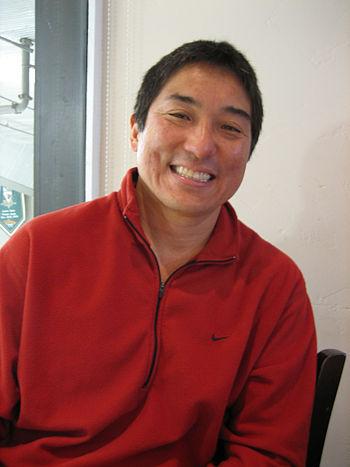
Guy Kawasaki, American venture capitalist and one of the original Apple Computer employees responsible for marketing of the Macintosh in 1984. (Photo credit: Wikipedia)
I read a Huffington Post article this morning, written by Guy Kawasaki, whom I had the pleasure of seeing speak at last year’s BlogHer Conference in Chicago, reviewing The Third Metric: Redefining Success and Creating a Life of Well-Being, Wisdom, and Wonder, written by Arianna Huffington of The Huffington Post. The article really, really spoke to me, as a woman, as a college graduate, and as a mother.
Now, I rarely write a post in reaction to another post, which is an advertisement for a Google+ Hangout that has already taken place. I normally just don’t operate that way. But this piece sort of stopped me in my tracks. Let’s Stop the Glorification of Busy, published on March 23, 2014 (where have I been?) seemed to be speaking directly to me.
Functioning in a culture that worships hard work (and hard play), I’ve been having an increasingly difficult internal struggle about what does (and what should) make me happy.
I’ve reached a point in my children’s young lives that they can occupy themselves for short spans of time. They take care of their own needs (to a degree, of course), and I’m left with some time to take care of my own. Except I haven’t done that really adeptly in quite some time.
My family is what one would affectionately call ‘old school’. You’d sooner catch them rubbing their fingers raw, washing pots in the sink (yes, the sink) with a dishrag, or scrubbing floors on their hands and knees, before you’d spy them on a patio, drinking a mimosa, reading a book.
This is positive in a way (valuing hard work), and very negative in another (devaluing personal time, space, interests, and recreational activities). According to my family (and probably many of yours), every waking moment should be productive.
I’ve had to explain to my mother, on several occasions, why I didn’t accomplish one task whilst another task was being completed (i.e. cleaning up the living room while the laundry was going), and the rationale is always simple: I was tired. I needed to rest.
“Well, that’s why things don’t get done!” she responds, with the wisdom of a thousand sages.
I recently brought someone in to help me clean the house, which plagued me with guilt from the first phone call to the moment they packed up their feather dusters and left. I thought it would unburden me from a great weight, except bringing them into my house only seems to have added more. I have yet to confirm a next appointment.
These are a few reasons Kawasaki’s post, discussing Huffington’s book, stuck with me. I don’t have permission to relax or enjoy myself as an adult, as a parent. I never have.
One part that really invaded my consciousness was a tip from Huffington on Redefining Success. It reads:
There’s no prize for working the most hours per week or making the most money. At the end of our lives, we’re all about the same amount of dust, so the question is how much joy you’ve brought into people’s lives and how much have you made the world a better place.
How true is this? At what point have you heard that loving couple of sixty years, on Today, talking about how well he or she loaded the dishwasher, how much laundry they were able to fold over a weekend, or how timely their oil changes were? How about how many cases of toilet paper they were able to score with double coupons? In the grand scheme of things, none of this matters.
In families stricken with illnesses or other untoward circumstances, there is almost never any mention of the menial tasks with which we’re all saddled.
And when I look back on my childrens’ lives thus far, I don’t think all the boxes of macaroni and cheese I’ve cooked or counters I’ve straightened have made any of us better people. Sure, there’s a lesson in there somewhere about hard work, discipline, and consistency, but these simply are not the experiences we will remember when looking back on our lives, or the lives and contributions of others. I have to remind myself of this almost daily.
All ten of the tips mentioned in the article – activities from walking away from the phone, tablet, or computer for a few hours, to simply taking care of and nurturing one’s self - are simple self-care necessities that we’ve collectively forgotten. And, ironically, all the activities we seem to value the least in terms of accomplishment are the very activities that contribute to our success as human beings.
My husband and I have been considering taking a few classes in the creative arts, but we’re burdened with the guilt of the everyday, and the expenses in both time and money. We’ve wavered, we’ve waffled, and because of that, we’ve yet to commit.
Will we excuse ourselves temporarily from the rat race to allow these indulgences? We’ll see.
What I have come to know, though, is there is more to life than work and sleep, and though I am well aware of what it takes to make a household or business run successfully, if we’re the conductors, the engines, we need preventative maintenance as well.
It’s time to stop feeling guilty and nurturing ourselves, for our own enduring health and happiness.
There’s a reason the old adage ‘Take time to smell the roses’ stays relevant after all these years. If we don’t, we’ll miss out, much like we miss out on our kids’ childhoods while hidden behind piles of laundry.
Do something good for you today, regardless of what it is, how it looks, or how others feel about it. I will, too.
After all, we deserve it. We really do.


